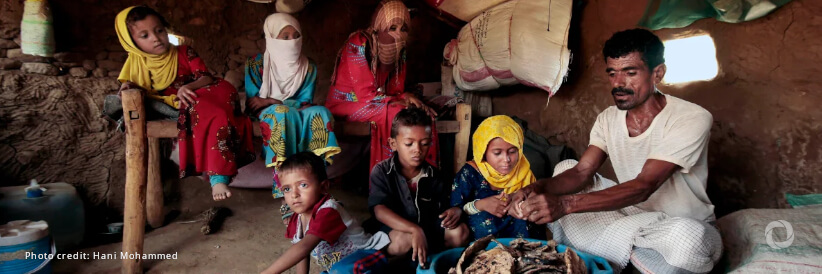As the conflict in Yemen enters its ninth year, millions of people continue to suffer damaging consequences. An astonishing 21.6 million people – over half of whom are children – are in dire need of humanitarian aid. Famine-like conditions pose the greatest challenge in what is one of the poorest countries in the Arab world, and more than 80 per cent of the population face struggles to access food, safe drinking water and adequate health services.
Yemen, already heavily reliant on imports, has been severely impacted by the war in Ukraine, with food supplies dwindling as a result of supply chain issues. Climate change is also being keenly felt, with Yemen ranked among the countries most vulnerable to climate change and least prepared to deal with its fallout.
A fractured nation
The prolonged conflict has had a devastating human cost. As of December 2022, more than 11,000 children had been killed or maimed as a result of the conflict, UNICEF reported.
While the last 6 months have seen a reduction in violence, Yemenis continue to live in fear. Landmines and other IEDs were responsible for the deaths of more than 300 civilians in 2022. Unexploded devices severely impact the daily lives of Yemenis as being unable to safely move around makes earning a living or attending school extremely challenging.
Women and girls continue to face significant additional restrictions on their movement particularly due to male guardianship, which requires women to be escorted by a male relative. This impedes women’s ability to work outside the home, including in the humanitarian sector. Meanwhile displaced people, people with disabilities and families with a woman or child at the head must confront additional obstacles.
A hunger crisis
Jubree, who lives in Hodeidah in western Yemen, has lost 4 children to malnutrition. The condition has affected not only all 10 of his children but also his wife.
“My wife was unable to even breastfeed her child for a month. When she was pregnant, she would experience severe fever, and when she gave birth, the baby was born alive but quite ill, and sometimes he or she died,” Jubree says.
His family has since benefitted from a health centre set up by Islamic Relief to treat malnourished children and mothers, but their situation is sadly not unique. Malnutrition figures in Yemen are among the highest in the world. The United Nations Office for the Coordination of Humanitarian Affairs (OCHA) estimates that around 1.3 million pregnant or breastfeeding women and 2.2 million children under 5 will require treatment for acute malnutrition in 2023.
“We cannot find a job”
“Our lives have become much more challenging than they were before the conflict started. We consequently have found ourselves in a dire financial situation that we cannot escape. Sometimes we find work, but there are other times when we do not. We cannot find a job, we are unemployed. Our lives have become increasingly difficult as a result of this. It is just a matter of working to survive and make ends meet. It is not for any other reason that we work. As an example, if my child becomes ill, then I cannot afford to treat him, nor can I afford to buy the medicine that he needs,” Hussein, a father-of-3 from Hodeidah says.
The lack of job opportunities makes it difficult for many to afford even basic items. In recent years, this has combined with spiralling costs, meaning that although food is available to purchase, few can afford to.
A lifeline for more than 2 decades
Islamic Relief has been supporting the people of Yemen since 1998. The organization work in tandem with the World Food Programme (WFP) to provide food to 2.1 million Yemenis every month, and, in 2022, we invested more than £4 million to supply thousands of families with clean drinking water.
The seasonal food distributions ensure families can break their fast during Ramadan and celebrate Eid with meat. IRW work supporting health facilities has seen them provide desperately needed health care, respond to outbreaks and rehabilitate facilities. Islamic Relief has trained health workers and support medical facilities to combat malnutrition in children and pregnant women, including internally displaced people.
Amid high unemployment, Islamic Relief runs a variety of livelihood projects, helping Yemenis take the first step to become self-reliant once more. The organization also support more than 52,000 orphaned children to continue their education and meet their basic needs. Despite the unwavering support, Islamic Relief believes that humanitarian aid alone cannot solve the crisis in Yemen – the underlying causes must be addressed.
“Yemen has suffered a lot… Yemen and its people have not been able to live a normal life. The only sustainable solution is the restoration of peace in Yemen. If this happens, people can go back to their homes and their livelihoods, children can go to school again. Even if this happens, the country will need another decade to recover – but this is the only solution, and it needs to happen soon,” Muhammad Zulqarnain Abbas, country director for Yemen, says.
Islamic Relief will remain a lifeline to those in need and help families who have been suffering for years, with the donations they can continue the vital work in Yemen.

